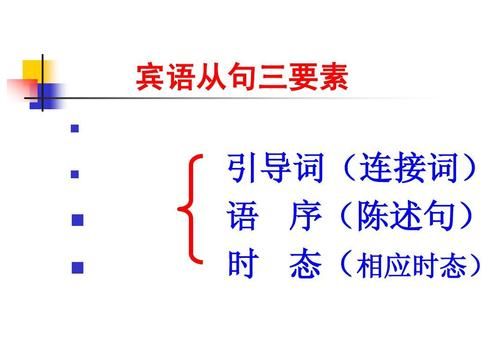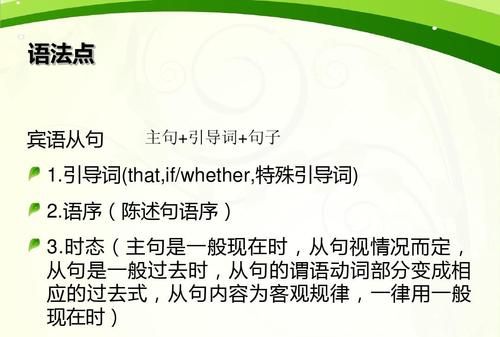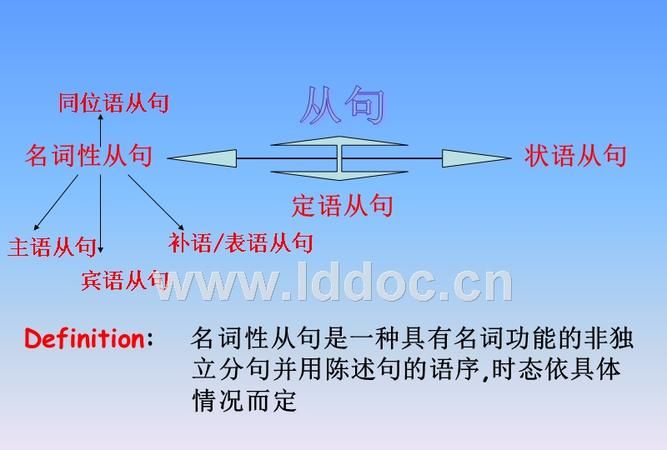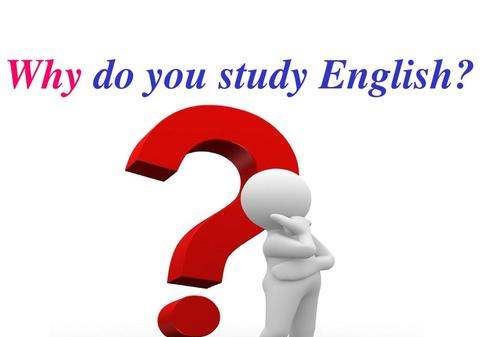本文目录
why在宾语从句中做什么成分
why引导定语从句时等于for which
why引导宾语从句时等于the reason why 也就等于the reason for which
例:
We don't know the reason why they have broken up with each other.= We don't know why they have broken up with each other.
我们不知道他们的关系为何破裂.

英语中宾语从句的时态需要跟主句一样吗
当主句为现在时或将来时,宾语从句的时态一般不受主句的时态所影响.
当主句为过去时
①从句用一般过去时或过去进行时表示与主句谓语动词动作同时发生
②从句过去完成时表示该动作发生在主句谓语动作之前
③从句谓语用过去将来时表示该动作发生在主句谓语动作之后
④如果从句是一个客观真理,那么从句的时态不根据主句的时态而变化
⑤当宾语从句的引导词是who,which,what,when,where,how,why等表疑问时,不能按正常语序安排,经常将这类引导词置于句首。
宾语从句的时态受主句的限制,既:主句是一般现在时态,从句根据实际情况而定。
主句是一般过去时态,从句用相应的过去的时态。如果从句的动作发生在主句之前,则从句要用过去完成时态。
例:
She says that she is a student.
She said that she was a student.
She says that she will fly to Japan in a week.
She said that she would fly to Japan in a week..
如果宾语从句说的是客观真理、自然现象或事实时,这时宾语从句要用一般现在时态。
例:The teacher said that the earth goes round the sun.
He told me that Japan is an island country.
Could you tell me…是用来征询对方的意见,语气委婉,并不表示过去。
例:Could you tell me when we will visit the Histury Museum。
宾语从句是名词性从句的一种。在主从复合句中充当宾语,位于及物动词、介词或复合谓语之后的从句称为宾语从句。宾语从句分为三类:动词的宾语从句,介词的宾语从句和形容词的宾语从句。

宾语从句的七种时态句子结构分析
宾语从句是主从复合句中最常见的从句之一。 它作及物动词、介词或者某些形容词的宾语。由于宾语从句涉及到引导词、语序、时态等多方面的内容。
一.宾语从句的定义
置于动词、介词等词性后面起宾语作用的从句叫宾语从句。宾语从句的语序必须是陈述语序。谓语动词、介词、动词不定式,v.-ing形式后面都能带宾语从句。有些形容词(afraid,sure,glad等)之后也可以带宾语从句。
二.宾语从句中引导词的用法
在复合句中作主句的宾语,引导词有:
连词:that (that 常可省略),whether, if
代词:who, whose, what ,which
副词:when ,where, how, why 等。
(一)that引导的宾语从句(在非正式场合that可以省略)
可跟that从句做宾语的动词有:
say, think, insist, wish, hope, demand, imagine, wonder, know, suppose, see, believe, agree, admit, deny, expect, explain, order, command, feel, dream, suggest, hear, mean, notice, prefer, request, require, propose, declare, report等。
例句:The boy believes that he will travel through space to other planets.
注意事项:当主句谓语动词是 think, believe, suppose, expect 等词,而宾语从句的意思是否定时,常把否定转移至主句表示。
例句:I don’t think it is right for him to treat you like that.
在以下情况中that不能省略
当句中的动词后接多于两个由that引导的宾语从句时,第一个that可省,但后面的that不可省。
例句:He said (that) you were too young to understand the matter and that he was asked not to tell you.
当主句的谓语动词与that宾语从句之间有插入语时,that一般不可省。
例句:Just then I noticed, for the first time, that our master was wearing his fine green coat and his black silk cap.
当that从句是双宾语中的直接宾语时,that不可省。
例句:I can’t tell him that his mother died.
注意事项:许多带复合宾语的句子,that引导的宾语从句经常移到句子后部,而用it作形式宾语。
例句:I find it necessary that we should do the homework on time.
(二)由whether,if 引导的宾语从句
由whether(if)引导的宾语从句,实际上是一般疑问句演变而来的。意思是“是否”。宾语从句要用陈述句语序。一般说来,在宾语从句中whether与if可以互换使用,但在特殊情况下if与whether是不能互换的。
例句:I wonder whether(if) they will come to our party.
只能用whether,不能用if引导的宾语从句
在带to的不定式前
例句:We decided whether to walk there.
在介词的后面
例句:I’m thinking of whether we should go to see the film.
在动词后面的宾语从句时
例句:We discussed whether we had a sports meeting next week
直接与or not连用时
例句:I can’t say whether or not thet can come on time.
只能用if不能用whether引导的宾语从句
if引导条件状语从句,意为“如果”
例句:The students will go on a picnic if it is sunny.
if引导否定概念的宾语从句时
例句:He asked if I didn’t come to school yesterday.
引导状语从句even if(即使)和as if(好象)时
例句:He talks as if he has known all about it.
(三)连接代词和连接副词引导的宾语从句
这样的宾语从句实际上是由特殊疑问句变化而来的,宾语从句要用陈述句语序。用于这种结构的动词常常是:see, say, tell, ask, answer, know, decide, show, find out, imagine, suggest, doubt, wonder, discover, understand, inform, advise等。
英语中的连接代词有:who,whom,whose,which,what,在句中担任主语、宾语、定语或者表语。
例句:Can you tell me whom you are waiting for?
英语中的连接副词有:when,where,why,how,在句中担任状语的成分。
例句:None of us knows where these new parts can be bought.
三.宾语从句的语序
宾语从句的语序是陈述句语序即:连接代词/副词+主语+谓语+其他成分。例句如下:
I don’t know what they are looking for.
Could you tell me when the train will leave?
Can you imagine what kind of man he is?
四.宾语从句的时态
主句是一般现在时,从句根据实际情况使用任何时态。
例句:The headmaster hopes everything goes well.
主句是过去时态,从句须用过去时态的某种形式。
例句:She was sorry that she hadn’t finished her work on time.
当宾语从句表示的是一个客观真理或者事实时,即使主句是过去时,从句也用一般现在时态。
例句:The teacher told his class that light travels faster than sound.
五.宾语从句的特点
宾语从句可以作及物动词、介词及形容词的宾语。
宾语从句的语序一律用陈述句语序。
连接词that引导宾语从句在句中无词义,不充当句子成份,多数情况下可以省略。
whether 和 if 都可引导宾语从句,但 whether后可紧跟or not;whether从句可作介词的宾语。
如果从句太长,可以用形式宾语it.

with有多少种用法
Why由两种用法:
1、构成“Why + 一般疑问句”的特殊疑问句;
2、用从句中,用来解释理由。
用why 提问通常有两种回答:
1、Because回答
2、The reason回答
具体用法如下:
一、why可以在句首用作疑问副词,表示“为什么”,用来询问发生某一动作或存在某一情况的原因、理由,构成“Why + 一般疑问句”的特殊疑问句。
例如:
1、Why do you like dogs?
你为什么喜欢狗?
2、Why are you late for school?
你为什么上学迟到了?
二、用从句中,用来解释理由。
例:
1、 This is the reason why I came so fast.
这就是我来这么快的原因。
2、I know why he is running fast.
我知道他跑得快的原因。
3、The reason why he did so is unknown.
他为什么这么做的原因不清楚。
三、用why 提问通常有两种回答
1、用Because回答
例:
Why are you late for school?
你为什么上学迟到了?
Because I got up late.
因为我起床晚了。
2、The reason回答
Why are you late for school?
你为什么上学迟到了?
The reason is my broken bike.
原因是我的坏自行车。

扩展资料
why的意思是为什么,一般用在句子的开头进行询问。
why
英 [waɪ] 美 [hwaɪ, waɪ]
adv.为何;为什么;
int.呵唷,哎呀
n.原因;理由;说明;
1、Why don't you leave this awful hole and come to live with me?
你为什么不离开这个破地方,搬过来和我住?
2、'Why can't you tell me?' I whined .
“为什么你不能告诉我?”我嘀咕道。
3、Why were you holding everyone up?
你为什么耽搁了大家?
4、Why, I wouldn't give the end off one of my fingers for all the money you've got!
哼,我是绝对不会碰你那些钱的!
5、Why do I have the feeling I'm being used again?
为什么我感觉又被利用了?
6、Why did you leave me behind?
你为什么要丢下我?
以上就是关于why引导的宾语从句时态 ,why在宾语从句中做什么成分的全部内容,以及why引导的宾语从句时态 的相关内容,希望能够帮到您。
